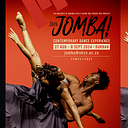HATCHED ENSEMBLE - A Rebirth
By Kristi-Leigh Gresse
As the JOMBA! Contemporary Dance Experience celebrates its 25th anniversary, Mamela Nyamza’s “HATACHED ENSEMBLE” sets the stage with a stripped-down design and wired figures. 9 performers, clad in white mesh skirts reminiscent of a traditional ballet romantic tutu adorned with wooden pegs, warm up under a soft glow of light. This emotive and personal journey turned public performance welcomes audiences with an intimate and unique experience.
“HATCHED ENSEMBLE” is a revised version of Nyamza’s 2007 solo performance, “Hatched”, where she shared her personal journey as both a mother and an artist. This work fearlessly addresses the complexities of our existence as South Africans, and Nyamza shares her intertwined personal journey as a tribute to those who find themselves residing on the outskirts. With “HATCHED ENSEMBLE”, Nyamza has expanded the scope of the performance to include the lives of the performers on stage. Regardless of size or gender, each performer wears a bare chest and a white ankle-length skirt layered with wooden pegs. They moved through the performance with a few simple classical ballet steps, the most recognizable of which is the “Bourrée”, which amplifies the soundscape for the first segment of the piece, referencing Nyamza and the ensemble’s early journey with the classical form.
The dancers move in unison, gracefully partnering with wire sculptures of roosters, windmills, Nguni cattle, trees, and the South African national flower the Protea, representing Nyazma’s connection to her homeland. Nyazma, a Xhosa woman artist from Cape Town, layers her work with elements of her heritage through costume, set, music, and movement, blending them with classical ballet to explore the complexities of her life. The 8 dancers on stage add to the performance’s richness, amplifying the piece’s layers and depth.
As the sea of dancing bodies moves through the classical style, the sound of wooden pegs clicking together fills the air. They reach a washing line draped with red dresses, and the movements become more laboured and weighted compared to the usual grace of classical ballet. The dancers struggle to drape their garments over the line, and once they complete this step, the next challenge is freeing themselves from their entrapment as they fight to release their red coats that are still pegged to the washing line.
Throughout Nyamza’s piece, the recurring image of weighted labour is prominent. As the work progresses, more effort is required due to the extent of the challenges of balancing motherhood and labouring life. Despite the difficulties, we are expected to make it look effortless, just as ballet appears to a non-dancer. This contrast highlights the weight-bearing nature of living within this layered identity, while still being expected to maintain a cheerful demeanor.
The lighting was gentle and comforting, leaving no room for hiding. Wilhelm Disbergen’s marvelous design complemented the not-so-smooth journey of the performance. The music started with a classical piece sung by opera singer Litho Nqai and transitioned to a grounded accompaniment of sounds by African multi-instrumentalist Azah Mphago. The music set the stage for the dancers, allowing their movements to progress from the vibrating hum of Bourrées to the rooted movements of the Ukutyityimba dance style, which is a dance style performed by Xhosa women and men during significant cultural ceremonies. Nyamza’s choice of these opposing dance styles, and how they relate to one another, dissects the meaning of living in a “post” existence and emphasises our connection to our history and lineage, as well as the history of the world.
“HATCHED ENSEMBLE” is both a reflection of our fragmented identities and how these culminate in our bodies by carrying the weight of our histories. Our lives intertwine, intersect, and blend together to create a complex design that can be expressed and performed without fear or embarrassment. Even when we are not aware, our bodies tell a story, and Nyamza reminds us to embrace these intricacies that shape our identity without judgement or shame. We should acknowledge the richness that it adds to our lives and not be afraid of living a plural existence.
JOMBA!’s 25th Anniversary continues until 10 September and tickets are available through computicket. See the full festival programme here: https://jomba.ukzn.ac.za/2023-programme/
